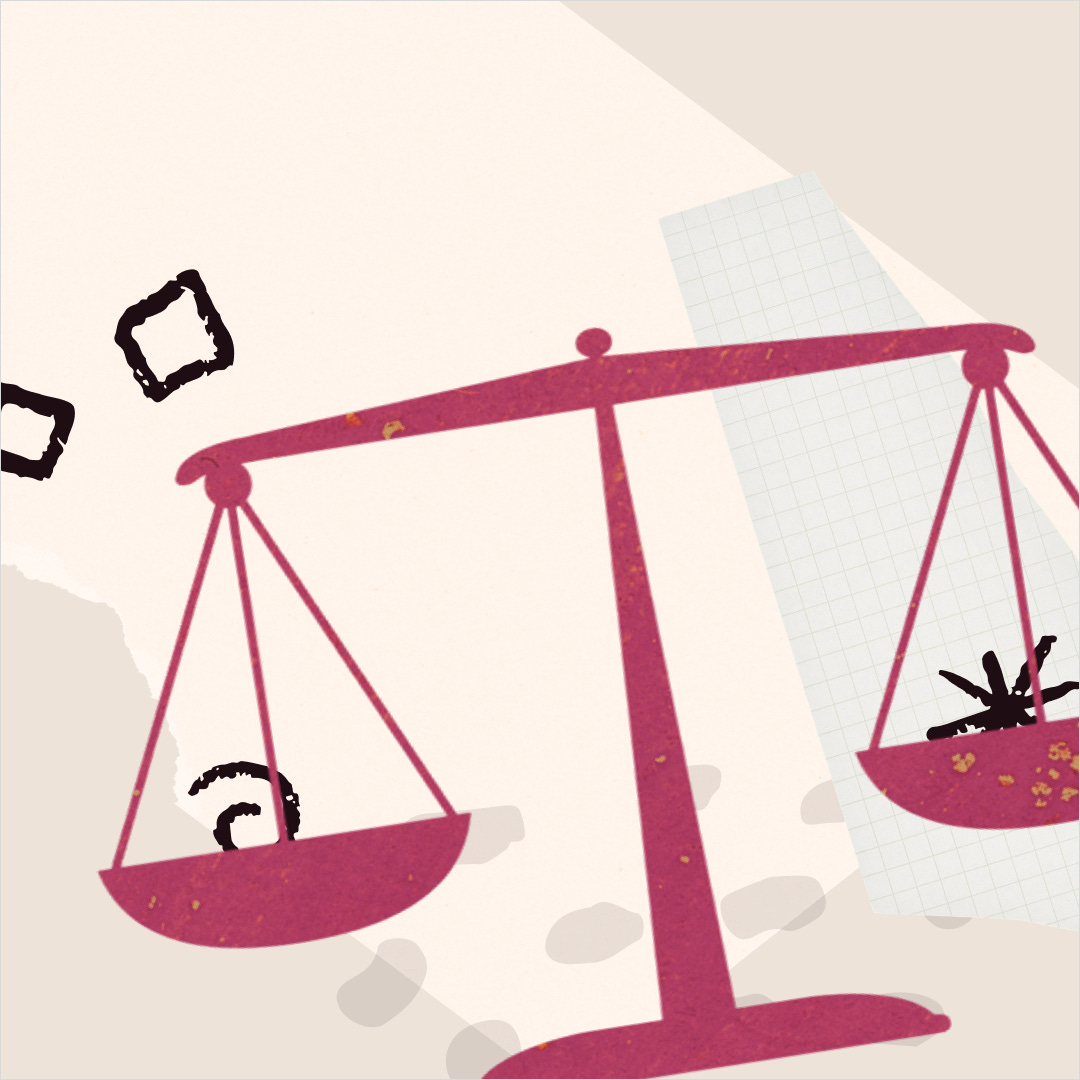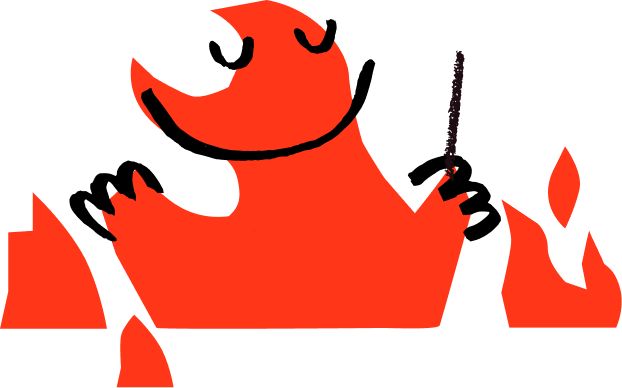You’re not lazy. You’re just tired of choosing everything.
The hidden toll of constant choice-making, and how creative people can reclaim mental space
I love being an entrepreneur and a creative. I love owning my own business with Kevan. I love knowing that my fate is in my own hands and that I have the power to influence the kinds of work we do and don’t do at Bonfire.
That is all true. And it’s also true that sometimes I sit on my kitchen floor in my pajamas at 2pm on a Wednesday and take one of my cats’ tiny, fuzzy faces between my trembling hands and beg, “Please, just tell me what to do!”
(Their answer is always “Give me wet food” which, while concrete and actionable, doesn’t help me, globally.)
This state, where I am fairly desperate for an organizing principle of my day, work, and life is a kind of tiredness that sleep can’t fix. And it’s not burnout, exactly.
It’s decision fatigue.
What is decision fatigue?
Decision fatigue is the mental wear and tear that comes from making too many choices—especially open-ended, high-stakes, or ambiguous ones. For many, it often looks like:
Endless tabs open “just in case”
Bouncing between ideas without landing on one
Overplanning instead of starting
Feeling stuck even when you have time and tools
Loss of motivation for things you intellectually know you care about
It’s like your life is a movie called Everychoice Everytime All Are Yours (somebody call A24!). And it’s a natural consequence when you spend your days making tiny—and not-so-tiny—judgment calls that are rarely binary or obvious. Not just choosing between A or B, but choosing from an endless void of possibilities:
What to work on next or prioritize
Which idea to run with
How to position something
What tool to use to get something done
What to say…
…then how to say it
Etc. etc. ad infinitum
Some of these decisions apply no matter what kind of work you’re doing or whether you’re employed by someone else or not. But for a lot of us—creatives, freelancers, founders, leaders—there’s an extra layer of weight. Because it’s not just about tasks; if we’re not careful, it becomes about identity.
Why independent operators are especially prone to decision fatigue
For freelancers, founders, high-level leaders, or anyone who’s their own boss, the fatigue can be even more high stakes and intense. There’s no one handing you a roadmap, telling you how things usually get done, or offering support. And while that kind of autonomy is powerful, it also means you’re constantly toggling between vision-holder, operator, and creative engine. And if any of it goes wrong…it’s all your fault!
Basically, you’re not just wearing all the hats—you’re deciding which hats even exist. It’s death by a thousand possibilities. You know how your browser will sometimes “clear” open tabs and only reload them when you come back to them in order to save processing space? Yeah, you’re doing that but IRL.
That’s a heavy cognitive load, even on a good day.
And if you’re someone designing your own path—hello, nonlinear career friends!—your decisions are not solely creative or business ones. You’re making existential decisions that reflect your identity. Every moment becomes a referendum on:
Is this still the kind of work I want to do?
Am I the kind of person who says/does this?
Am I communicating what I think I’m communicating?
Will this work reflect my values and vision?
Is this the right next step for my career?
Am I prepared to live with the consequences of [decision] with no one to blame but myself?
And remember, your brain is burning up a little bit of mental energy with every decision that you make, every time you switch contexts or gears. So yeah. That’ll tire a person out.
Quick ICYMI: We’re hosting an IRL retreat in the French countryside all about intentional career design! Let us know if you’re interested so we can reserve a château spot for you. :)
So...what do we do about it? (😅)
We don’t need to eliminate decision-making. We just need to lighten the cognitive load. Here are a few things that might help:
Choose once, reuse often
Pick your default formats, tools, or starting points so you’re not reinventing the wheel every time. Create one go-to brief template. (Or use some of ours!) Keep a few reusable storytelling frameworks. Have a process or checklist you start with, even if it only gets you 80% of the way there.
Let some stuff be plug-and-play.
Set constraints
Think of limits as creative co-pilots, not obstacles. Too much freedom = paralysis. Give yourself a timer. A theme. A narrow audience. Choose a palette and don’t change it. It sounds counter-intuitive to set limits to get things done, maybe, but think about it as conserving the mental and energetic fuel to work vs. using that same fuel to decide moment by moment what comes next.
You can even think about this with bigger chunks of time. Your brain works better when it knows what mode it’s in. So maybe Mondays = vision. Wednesdays = execution. Fridays = review + reset.
Externalize the swirl
The longer ideas live in your head, the more pressure they build and energy they gobble. Subconsciously, you may be “afraid” of forgetting something important, so you keep all the burners lit up at once. Draining!
Instead, brain-dump into a doc or a voice note. Say it out loud to a (very patient) friend. Have a notebook or sticky pad handy where you can quickly throw an idea out of your brain and know it’ll be there when you’re ready for it. And then completely forget it. Bliss.
Be short sighted
Make a list of “tiny next steps." Like literally only (!) the things you can do immediately next and nothing else.
Think: “Reply yes to Person’s collaboration invite” vs. “Collaborate with Person on newsletter.” Or try: “Price comparison between Trello and Monday” vs. “Get project management software set up.”
Only do exactly the next step, and not a single thing more. You’ll shock yourself with how much progress you can make and how much this soothes overwhelm.
Decide when, not what
Sometimes just reducing ambiguity is enough. Instead of asking “What should I work on?,” try “At 3pm, I’ll pick something to work on for an hour.” Maybe you even decide what that thing is by flipping a coin. And maybe you’ll start to work on it and realize that you’d rather be doing something else, or something else will feel more important. That doesn’t mean you wasted time; it means you created clarity! (Remember: Thinking doesn’t create clarity, but action does!)
You’re not failing. You’re fatigued.
You’re not behind. You’re not unmotivated. You’re just tired of deciding everything, all the time.
Make space. Set a few defaults. Let good enough be good enough. And take a rest—a real rest!—if you can.
Notable links, convos, and events
Resonating with this topic? This is the vibe happening inside Campout all the time—through conversations, tools, and intentional career design concepts that put creativity (and your sanity) first. If you’re not a member yet, you’re always welcome to join us!
This month’s free Campout event: Personal Brand on Your Terms & Conditions with Callie Rojewski! Join us this Thursday, June 26th, at noon ET.
Kristen Pavle, our Campout community manager, surfaced some interesting advice she heard lately: “Manage your energy not your time.” But in this post in our Ask Anything channel, she’s asking a great question: “Uhhh, how exactly?!”
But wait! There’s more…
Wanna be friends?
If you love this newsletter and wish it were more interactive, you’re in luck! Join us over in Campout, our digital community for creative marketers and the creative curious.
Wanna work with us?
If you need help with brand strategy and storytelling, fractional brand and marketing leadership, and bringing your brand strategy to life in impactful ways, send us an email at hello@aroundthebonfire.com to get in touch.
As always, you can find us on LinkedIn, Instagram, and Threads.







"It’s death by a thousand possibilities."
Oof, say it again for the people in the back. Perfectly describes how I feel about decision fatigue and it's so hard to explain to people when I'm ordering the same thing from the same restaurant 2 days in a row. I just need to not think sometimes.
Great article and relatable writing. I love the image of you on the floor interacting with your cat. As a retired MH professional I can relate to the dangers of cognitive overload. Decision fatigue can mimic and or exacerbate types of depressive and anxiety disorders.